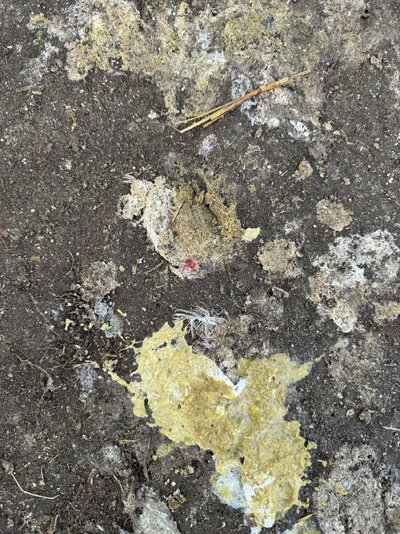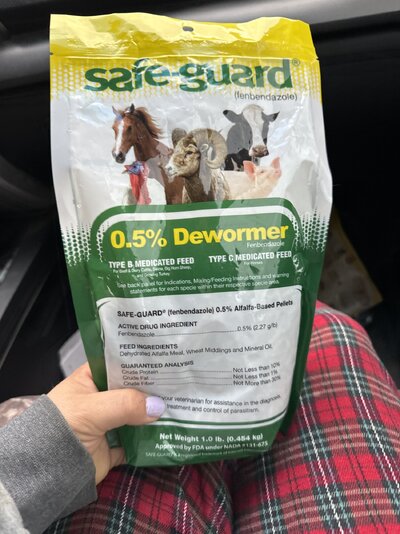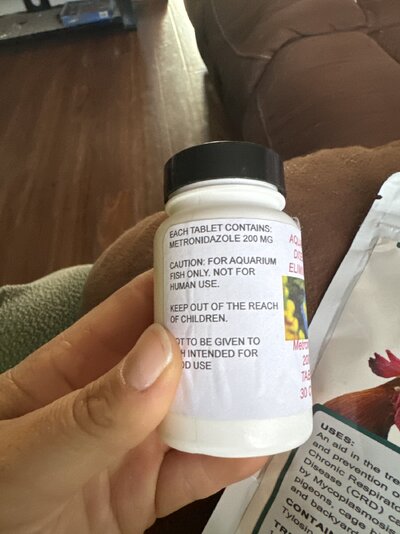Navigation
Install the app
How to install the app on iOS
Follow along with the video below to see how to install our site as a web app on your home screen.
Note: This feature may not be available in some browsers.
More options
You are using an out of date browser. It may not display this or other websites correctly.
You should upgrade or use an alternative browser.
You should upgrade or use an alternative browser.

Is your geese showing signs of worms? If not, I suggest holding back on worming them, as worming them can kill off the good parasites as well as the bad.
Tagging @Goosebaby.
- Thread starter
- #3
How is your goose behaving? Has he been acting depressed?, “not as energetic, standing around with beak tucked in to his wing more often?” Has he been eating less? Have you noticed if his legs or beak have gotten paler?
How long has he been getting blood in his droppings?
Have you noticed any other unusual colors in his droppings like black, orange, pink? Have you noticed any bubbly droppings or mucous in his droppings?
red blood in the droppings indicates bleeding low in the digestive tract, so that’s where the trouble is at, whatever it is. The other dropping in the picture looks pretty yellow and bubbly, I’m not sure if it’s his or not but if it is I’d say he definitely has a lower intestinal issue.
it could be worms or coccidia, more likely coccidia than worms but you can try treating both.
For coccidia you can try Corid (amprolium) which will clear it up. Toltrazuril will completely kill the coccidia and you only need to treat for 3 days.
For worms safeguard horse paste or goat wormer (Fenbendazol) works for most worms.
Giardia and clostridium are other potential causes of this.
Giarda and Clostridium can be treated with an antibiotic called Metronidazole, Clostridium is also treated with an antibiotic called Tylosin.
Apple cider vinegar isn’t as acidic as stomach acid so it’s doubtful it would be killing off any bad stomach bugs or bacteria, but one thing that could be going on is if you’re giving ACV with the mother the high probiotic load in it could be combating whatever bad bacteria is festering in his lower gi tract.
If that’s the case it’s certainly beneficial but it isn’t fixing the problem.
How long has he been getting blood in his droppings?
Have you noticed any other unusual colors in his droppings like black, orange, pink? Have you noticed any bubbly droppings or mucous in his droppings?
red blood in the droppings indicates bleeding low in the digestive tract, so that’s where the trouble is at, whatever it is. The other dropping in the picture looks pretty yellow and bubbly, I’m not sure if it’s his or not but if it is I’d say he definitely has a lower intestinal issue.
it could be worms or coccidia, more likely coccidia than worms but you can try treating both.
For coccidia you can try Corid (amprolium) which will clear it up. Toltrazuril will completely kill the coccidia and you only need to treat for 3 days.
For worms safeguard horse paste or goat wormer (Fenbendazol) works for most worms.
Giardia and clostridium are other potential causes of this.
Giarda and Clostridium can be treated with an antibiotic called Metronidazole, Clostridium is also treated with an antibiotic called Tylosin.
Apple cider vinegar isn’t as acidic as stomach acid so it’s doubtful it would be killing off any bad stomach bugs or bacteria, but one thing that could be going on is if you’re giving ACV with the mother the high probiotic load in it could be combating whatever bad bacteria is festering in his lower gi tract.
If that’s the case it’s certainly beneficial but it isn’t fixing the problem.
Safeguard dosage is 0.23 ml per pound for 5 days
metdonidazole dosage is 10 to 50 mg per kg once or twice daily for 5 to 10 days, depending on the severity of symptoms.
Tylosin powder dosage is 20 to 40 mg per kg twice daily.
Most sources I’ve found state 20 to 30 mg per kg but Tylosin is mostly used in it‘s liquid form as an injectable “tylan 200” and unless you have an extra person to assist you while injecting your bird twice a day it’s far more feasible to administer it orally via syringe. The avian digestive system works fairly fast so the higher dosages are more effective in my experience. In my state only the powdered form is available.
if it’s a clostridium infection Tylosin and metronidazole are most effective when used in combination with each other.
https://birdpalproducts.com/products/tylosin-powder-for-birds?_pos=1&_sid=32450c6be&_ss=r
Directions on the bag are for mixing it into water but the taste is so horrible my geese never touch it, I have to make them take it orally from a syringe. It has to be measured out with a gram scale for the most accurate dosage and then mixed with water but if You get the dosage wrong and overdose it, it doesn’t cause severe side effects like it does in cats.
various places you can get metro
https://birdpalproducts.com/products/metronidasole-fish-capsules-200-mg?_pos=2&_sid=e0f9f5421&_ss=r
https://countrysidepet.com/search.php?search_query_adv=Metronidazole+
https://okiedogsupply.com/fish-zole-metronidazole-250mg-30ct/
metdonidazole dosage is 10 to 50 mg per kg once or twice daily for 5 to 10 days, depending on the severity of symptoms.
Tylosin powder dosage is 20 to 40 mg per kg twice daily.
Most sources I’ve found state 20 to 30 mg per kg but Tylosin is mostly used in it‘s liquid form as an injectable “tylan 200” and unless you have an extra person to assist you while injecting your bird twice a day it’s far more feasible to administer it orally via syringe. The avian digestive system works fairly fast so the higher dosages are more effective in my experience. In my state only the powdered form is available.
if it’s a clostridium infection Tylosin and metronidazole are most effective when used in combination with each other.
https://birdpalproducts.com/products/tylosin-powder-for-birds?_pos=1&_sid=32450c6be&_ss=r
Directions on the bag are for mixing it into water but the taste is so horrible my geese never touch it, I have to make them take it orally from a syringe. It has to be measured out with a gram scale for the most accurate dosage and then mixed with water but if You get the dosage wrong and overdose it, it doesn’t cause severe side effects like it does in cats.
various places you can get metro
https://birdpalproducts.com/products/metronidasole-fish-capsules-200-mg?_pos=2&_sid=e0f9f5421&_ss=r
https://countrysidepet.com/search.php?search_query_adv=Metronidazole+
https://okiedogsupply.com/fish-zole-metronidazole-250mg-30ct/
- Thread starter
- #4
Is your geese showing signs of worms? If not, I suggest holding back on worming them, as worming them can kill off the good parasites as well as the bad.
Tagging @Goosebaby.
No sure he just has a little blood in stool but otherwise healthy it comes and goes over the last 3 months if I give him apple cider vinegar seems to go away until I stop using it and he shakes his head alot
Attachments
I'd be concerned about something different, not worms. I'm not very knowledgeable on goose ailments... (For the nine years I had geese, I didn't have any major issues.) If this was a chicken, I'd question Coccidiosis, but I don't know if geese get that. Is your goose showing any signs of anything else other than this? Did your goose eat anything by accident recently? What is your goose's normal diet? How clean of an environment is it living in? (Dirty coop and run; or something I've had an issue with: buried trash from previous land owners.) Does your goose free range and have access to a natural water source? (Lake, pond, stream. Those places could contain trash carried from other places. ) Are any of your other geese having issues?
- Thread starter
- #10
Can I use this on geeseSafeguard dosage is 0.23 ml per pound for 5 days
metdonidazole dosage is 10 to 50 mg per kg once or twice daily for 5 to 10 days, depending on the severity of symptoms.
Tylosin powder dosage is 20 to 40 mg per kg twice daily.
Most sources I’ve found state 20 to 30 mg per kg but Tylosin is mostly used in it‘s liquid form as an injectable “tylan 200” and unless you have an extra person to assist you while injecting your bird twice a day it’s far more feasible to administer it orally via syringe. The avian digestive system works fairly fast so the higher dosages are more effective in my experience. In my state only the powdered form is available.
if it’s a clostridium infection Tylosin and metronidazole are most effective when used in combination with each other.
https://birdpalproducts.com/products/tylosin-powder-for-birds?_pos=1&_sid=32450c6be&_ss=r
Directions on the bag are for mixing it into water but the taste is so horrible my geese never touch it, I have to make them take it orally from a syringe. It has to be measured out with a gram scale for the most accurate dosage and then mixed with water but if You get the dosage wrong and overdose it, it doesn’t cause severe side effects like it does in cats.
various places you can get metro
https://birdpalproducts.com/products/metronidasole-fish-capsules-200-mg?_pos=2&_sid=e0f9f5421&_ss=r
https://countrysidepet.com/search.php?search_query_adv=Metronidazole+
https://okiedogsupply.com/fish-zole-metronidazole-250mg-30ct/
Attachments
- Thread starter
- #13
Ok thank youHe’s head shaking too..thats a sure sign of either an upper respiratory or intestinal infection. Parasites or a bacterial infections cause the digestive system to slow down and can cause them to salivate or even regurgitate which makes them head shake and flick the excess fluid out.
You might try feeling for his lower intestinal to see if it’s swollen, with clostridium/ enteritis but also sometimes with giardia and coccidia the lower intestine can become inflamed, it will feel like a hard ball or even an egg between his pelvis and ribcage. If you reach just below his tail you’ll feel two hard bulbs base of his tail, those are the rear ends of his pelvic bones, reach brown further and you’ll feel his rib cage, his lower intestines and just between there and they should feel soft and gooey. If it feels hard its inflamed, if you hear loud gurgling or what sounds like moving sand or popping that means there’s a lot of gas, a result of an infection.
I would definitely try to get him on corid and and think about getting him on an antibiotic, metro and Tylosin would be best if it’s a clostridial or Giardia infection, another option is an antibiotic called SMZ TMP, it will kill off coccidia and a number of other bad bacteria, it’s fairly broad spectrum so it will also target a lot of good bacteria though so I would suggest giving a good probiotic or kefir also. SMZ TMP doesn’t treat clostridium though.
- Thread starter
- #14
Safeguard dosage is 0.23 ml per pound for 5 days
metdonidazole dosage is 10 to 50 mg per kg once or twice daily for 5 to 10 days, depending on the severity of symptoms.
Tylosin powder dosage is 20 to 40 mg per kg twice daily.
Most sources I’ve found state 20 to 30 mg per kg but Tylosin is mostly used in it‘s liquid form as an injectable “tylan 200” and unless you have an extra person to assist you while injecting your bird twice a day it’s far more feasible to administer it orally via syringe. The avian digestive system works fairly fast so the higher dosages are more effective in my experience. In my state only the powdered form is available.
if it’s a clostridium infection Tylosin and metronidazole are most effective when used in combination with each other.
https://birdpalproducts.com/products/tylosin-powder-for-birds?_pos=1&_sid=32450c6be&_ss=r
Directions on the bag are for mixing it into water but the taste is so horrible my geese never touch it, I have to make them take it orally from a syringe. It has to be measured out with a gram scale for the most accurate dosage and then mixed with water but if You get the dosage wrong and overdose it, it doesn’t cause severe side effects like it does in cats.
various places you can get metro
https://birdpalproducts.com/products/metronidasole-fish-capsules-200-mg?_pos=2&_sid=e0f9f5421&_ss=r
https://countrysidepet.com/search.php?search_query_adv=Metronidazole+
https://okiedogsupply.com/fish-zole-metronidazole-250mg-30ct/
Attachments
Similar threads
New posts New threads Active threads
-
Latest threads
-
Clavicillin question (sick hen)
- Started by Cristyloks
- Replies: 0
-
My hen isn’t opening her one eye
- Started by crunchygranola
- Replies: 1
-
Looking for d'Anver and Nankin hatching eggs
- Started by WNYgardener
- Replies: 0
-
Here We Go Again. Bloody Stool!
- Started by Frizzlett98
- Replies: 0
-
-
-
Threads with more replies in the last 15 days
-
-
-
Ended Official BYC Caption Contest 05-10-24 Pic by LavenderDaFlerf
- Started by BYC Project Manager
- Replies: 81
-
-
Open Contest BYC's 4th of July Star Spangled Hatch-Along—Stars, Stripes, & Feathers, a Text-to-Image Contest
- Started by Debbie292d
- Replies: 79
-





